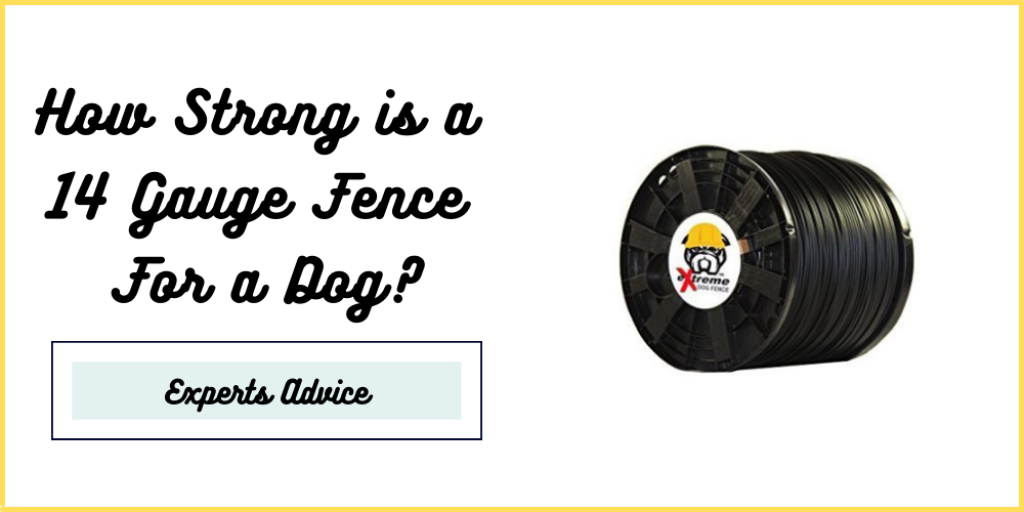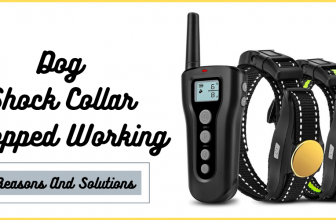A dog fence must have the proper gauge wire to make it efficient. Many people choose 14 gauge for a dog fence because of its characteristics. While it is an appropriate wire for dogs, its actual strength is not well known by people in general. Below you can find all the information you need about 14 gauge wire in a dog fence.
Contents
How Strong is a 14 Gauge Fence For a Dog?
To answer this, it is necessary to mention that there are different gauges for electric dog fence wire. One of the thinnest gauges is 20 gauge wire. There are also other intermediate and thicker options such as 18 gauge wire or 16 gauge wire.
This means that the smaller the gauge, the thicker the wire. The 14-gauge wire is one of the thickest and most appropriate wires for any type of electric dog fence. At the same time, the thickness of this wire is not too much, which is why it is also a versatile and flexible enough wire to install.
In general, these wires usually have a solid core which is combined with the thickness of each wire. So, a fence that includes a 14″ wire can be strong enough for any breed of dog. Here the thickness is also important when considering the lifetime of the entire electric dog fence.
Among the main factors of service life, a 14-gauge wire can resist more efficiently against different climatic factors. Here we can consider both exposures to the sun’s rays, expansion, and contraction movements of the soil, freezing temperatures, wind, or exposure to water.
Is a 14 Gauge Wire Strong Enough for a Dog Fence?
When it comes to installing a dog fence, the most common gauges are 20 gauge, 18 gauge, and 16 gauge. However, one of the strongest gauges to be used for a dog fence is 14 gauge wire.
A 14 gauge wire means a wire with a solid core that is much stronger than the other gauges we have mentioned. While it may be more expensive than the other gauges, 14 gauge wire offers adequate strength and durability to always keep dogs within the safe zone.
It is also a much better wire to be able to withstand the various damaging factors of the weather. In particular, 14-gauge wires usually have some sort of special coating.
This makes it possible for the dog fence to withstand heavy rains, temperatures that are too high or too low, or constant exposure to UV rays.
Also Read: Are Invisible Dog Fence Collars Interchangeable?
Can You Use 14 Gauge Wire for the Underground Dog Fence?
When it comes to the installation of a subway dog fence, 14 gauge wire is one of the most recommended options. About signal transmission, the gauge of the wire used in the subway dog fence does not make a big difference. However, a thicker wire can provide a much more efficient signal range.
So, using a 14-gauge wire can avoid the signal drop when burying the wire in some areas. As mentioned, the thicker cable also means greater durability and longer life. Hence, a 14-gauge wire can be used in a subway dog fence to protect the functionalities throughout its lifetime.
Additionally, it should be noted that a 14-gauge wire can be buried deeper than thinner wires. Because the thicker wire protects the signal strength, this can avoid some inconvenience during installation. A subway dog fence must sometimes cross a sidewalk or driveway.
Both the sidewalk and other hard materials, such as concrete, can be enough to weaken the signal of the subway dog fence. That’s why considering a 14-gauge wire can avoid all these problems. What’s more, the greater thickness of this wire also provides greater resistance against bites from rodents and other animals.
Can I Use Regular Wire for the Dog Fence?
Dog fence systems are designed to be able to work with some specific wires. Some of the most commonly used wires are 20 gauge wire as the thinnest or 14 gauge as the thickest wire option. There are also other intermediate options such as 18-gauge wire or 16-gauge wire.
In any case, it is not possible to use regular wire for a dog fence. In addition to gauge, the wire used in a dog fence must meet some basic characteristics. When it comes to an indoor application, the regular wire may be useful, although this is too fragile and cheap an option that may impair the performance of the dog fence.
Of course, a dog fence is usually installed in outdoor spaces. So, a regular wire may not have enough characteristics to withstand the various damaging factors. Some of the most common factors are weather conditions, such as exposure to water and rain, exposure to sunlight, freezing temperatures, and many other factors.
Any professional knows that braided wires that are rated for burial are best suited for subway dog fencing. The solid core insulated wire may also be appropriate. Among all the options that include these types of cables, plastic or polyethylene sheathing is recommended.
What Gauge Wire Fencing is the Strongest?
The 9-gauge wire is one of the strongest options when it comes to animal fencing. However, this thick wire is usually incorporated when dealing with large animals that are easily spooked. When dealing only with large animals with a lot of weight, such as cows or horses, 12.5 gauge wire is usually considered.
Any of these gauges are not typically used for a dog fence or landscaping project. 14-gauge wire is strong enough to withstand the behavior of larger dogs. When dealing with medium or small-breed dogs, 20-gauge, 18-gauge, or 16-gauge wire can be used.
Conclusion:
A dog fence that includes 14 gauge wire can provide great features. It is certainly a strong enough wire to work efficiently with large breed dogs. While other thicker wires are available, the 14-gauge wire does the job well.
It is also an excellent choice for withstanding damaging weather conditions. So having 14 gauge wire for any dog fence is more than enough. More you can read about dog fence wires at this page.








